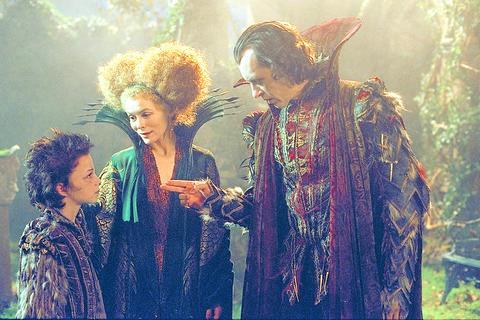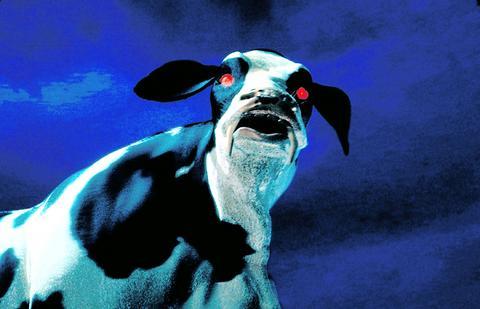No Halloween trickery is involved in this announcement: The Little Vampire is a treat.
Not often does a family film come along that is literate, clever, mischievous and just plain fun. Directed by Uli Edel Christiane F and Last Exit to Brooklyn) and based on the popular Little Vampire novels by Angela Sommer-Bodenburg, this delightful juvenile adventure upsets the all-too-familiar autumn applecart in various ways.
First of all, the vampires, though tormented, are sweet. They'd really rather be humans, and rather than sup on their own previous species, they turn to cows, though not for the milk. This preference leads to scenes in which some hefty bovines, having joined the undead, spurn the sunlight of the field and choose the darkness of the barn, where they hang head down from the rafters, much to the bemusement of Farmer Mclaughlin (Jake D'Arcy).

PHOTO COURTESY OF HUACHAN
And what fun it is to hear Anna (Anna Popplewell), a pouty-lipped little vampire, tell Tony Thompson (Jonathan Lipnicki), a nine-year-old human, "If you ever need me, just whistle. You know how to whistle, don't you?"
And to hear Anna's brother Rudolph (Rollo Weeks) speak the king's English when he bids Tony goodbye, saying, "I suppose I must take my leave."
Anyway, pleasures of all sorts are to be found in The Little Vampire, which revolves around Tony, uprooted from his home in San Diego to move with his parents to Scotland, where his father is designing a golfing resort for Lord Mcashton (John Wood), whose family has a few secrets. Tony, played with un-self-conscious charm by the actor who portrayed Rene Zellweger's little boy in Jerry Maguire, has been having repeated nightmares about a cliffside vampire ceremony involving a comet, an amulet, an incantation and the untimely intervention of a vampire killer. In the manner of adults, his parents (Pamela Gidley and Tommy Hinkley) are concerned but dismissive. To make Tony's life more difficult, Lord Mcashton's grandsons are bullying him.

PHOTO COURTESY OF HUACHAN
But Tony's dreams are portents of reality, and soon he has encountered and been befriended by Rudolph. And through Rudolph, he meets Rudolph's parents, Frederick and Freda, played with stylish comic spirit by Richard E. Grant and Alice Krige.
With the comet set to reappear, the time is ripe for Frederick to restore his vast clan to human form. But with the vampire killer Rookery (Jim Carter) lurking in the darkness and the amulet still missing after hundreds of years, it will be up to Tony to save the day. Sorry. Save the night.

On April 26, The Lancet published a letter from two doctors at Taichung-based China Medical University Hospital (CMUH) warning that “Taiwan’s Health Care System is on the Brink of Collapse.” The authors said that “Years of policy inaction and mismanagement of resources have led to the National Health Insurance system operating under unsustainable conditions.” The pushback was immediate. Errors in the paper were quickly identified and publicized, to discredit the authors (the hospital apologized). CNA reported that CMUH said the letter described Taiwan in 2021 as having 62 nurses per 10,000 people, when the correct number was 78 nurses per 10,000

As we live longer, our risk of cognitive impairment is increasing. How can we delay the onset of symptoms? Do we have to give up every indulgence or can small changes make a difference? We asked neurologists for tips on how to keep our brains healthy for life. TAKE CARE OF YOUR HEALTH “All of the sensible things that apply to bodily health apply to brain health,” says Suzanne O’Sullivan, a consultant in neurology at the National Hospital for Neurology and Neurosurgery in London, and the author of The Age of Diagnosis. “When you’re 20, you can get away with absolute

May 5 to May 11 What started out as friction between Taiwanese students at Taichung First High School and a Japanese head cook escalated dramatically over the first two weeks of May 1927. It began on April 30 when the cook’s wife knew that lotus starch used in that night’s dinner had rat feces in it, but failed to inform staff until the meal was already prepared. The students believed that her silence was intentional, and filed a complaint. The school’s Japanese administrators sided with the cook’s family, dismissing the students as troublemakers and clamping down on their freedoms — with

As Donald Trump’s executive order in March led to the shuttering of Voice of America (VOA) — the global broadcaster whose roots date back to the fight against Nazi propaganda — he quickly attracted support from figures not used to aligning themselves with any US administration. Trump had ordered the US Agency for Global Media, the federal agency that funds VOA and other groups promoting independent journalism overseas, to be “eliminated to the maximum extent consistent with applicable law.” The decision suddenly halted programming in 49 languages to more than 425 million people. In Moscow, Margarita Simonyan, the hardline editor-in-chief of the